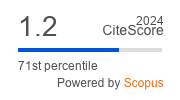Autobiographical Narrative as a Tool of Studying Traumatic Memory
Keywords:
autobiographical narrative, psycholinguistic analysis, traumatic memories, post-traumatic stress disorder.Abstract
The paper presents the results of the theoretical and empirical study of the possibilities of using autobiographical narrative for diagnosing the traumatic memory of the individual. The views of foreign and local psychologists on the nature of the generation of narrative, it’s using as a powerful psychotherapeutic tool. The features of representation experience and selectivity of consciousness regarding to its preservation have been described. The empirical study was based on the method of autobiographical narrative with the topic: “Traumatic event in my life” and Mississippi scale for assessing post-traumatic stress reactions. Based on the data analysis of psycholinguistic autobiographical narrative was created three-level scale ratio, that typical only for texts with traumatic content. We described the characteristics of psycholinguistic indicators, which can serve as guidelines in the diagnostic study of the traumatic experience of the individual. According to the features of writing autobiographical narrative by diagnosed, done its division into four types: ambivalent, neutral, negative and positive. Estimated level of posttraumatic stress disorder of patients and based on these data, done the analysis of the relationship between the type of autobiographical narrative and the level of posttraumatic stress disorder. Offered and proved the feasibility of using autobiographical narrative as a diagnostic tool in the study of traumatic memory of the individual.References
- Barclay, C. (1996). Autobiographical remembering: Narrative constraints on objectified
selves. Remembering our past: Studies in autobiographical memory, 94–125. - Brewer, W. (1986). What is autobiographical memory? Autobiographical memory, 25–49.
- Brown, R., Kulik, J. (1977). Flashbulb memories. Cognition, 5(1), 73–99.
- Zasiekina, L. (2012). Naratyvnyi dosvid vis-à-vis zdorovju osobystosti [Narrative
experience vis-a-vis the health of individual]. Psychological Prospects, 19, 101–110. - Kalmykova, E. (1998). Narrativ v psihoterapii: rasskazy pacyentov o lichnoj istorii
[Narrative in psychotherapy: stories from patients about personal history]. Psychological Journal,
19 (5), 97–103. - Sarbin, T. (1986). Narratology as a root metaphor in psychology. Narrative Psychology:
The Storied Nature of Human Conduct, 14–68. - Shulevska, O. (2003). Psychologichni osoblyvosti porodzennja naratyvu jak zasobu
samorozvytku osobystosti [Psychological features of producing narrative as a means of personality’s
self-development]. Kyiv.
Downloads
Download data is not yet available.
Downloads
Published
2014-11-29
Issue
Section
Vol 1 No 1 (2014)
How to Cite
Vasyliuk, O. (2014). Autobiographical Narrative as a Tool of Studying Traumatic Memory. East European Journal of Psycholinguistics , 1(1), 201-208. https://eejpl.vnu.edu.ua/index.php/eejpl/article/view/229







 Creative Commons «Attribution» 4.0
Creative Commons «Attribution» 4.0